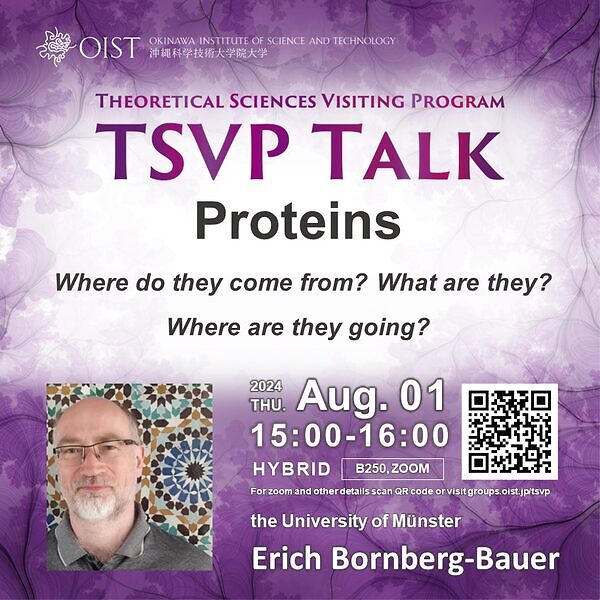TSVP Talk: "Proteins: Where do they come from? What are they? Where are they going?" by Erich Bornberg-Bauer

Date
Location
Description
Title: Proteins: Where do they come from? What are they? Where are they going?
Abstract: Life on earth emerged from simple molecules, including amino acids, fatty acids and sugars. Over time, these molecules arranged into concatenated structures and formed proteins, lipids and carbohydrates, respectively.
Proteins in particular became essential and universal agents of all forms of life. While probably only being assets to RNA molecules in an RNA world, over billions of years proteins evolved into myriads of families with different structures (shapes) and with different "functions", activities tailored to perform a task in cells which were becoming increasingly complex. Nowadays, proteins perform the key functions of life. Proteins carry oxygen in blood, make up muscles, perform photosynthesis, enable our vision but also cause antibiotic resistance. No proteins - no life.
Yet understanding what makes proteins special, how and if at all their structure determines their function and how to rationally construct proteins with desired activities remains essentially unsolved. For long it was assumed that all new proteins emerge, one way or another, from existing proteins, essentially by duplicating and modifying their underling genes. However, since several years it is known that new proteins also arise de novo, i.e. encoded by de novo genes from previously non-coding DNA. An important first step in the creation of de novo genes is that some of the zillions of randomly generated transcripts encode proteins with some, though very weak, inherent activity or at least are not toxic to the cell and are not quickly lost again before they become fixed and can be adapted to the existing cellular network. Since these proteins are akin to random proteins, studying them holds the promise to understand protein evolution as a whole and the making of proteins with a specific structure and function in particular. Accordingly, we study random proteins and de novo proteins from various genomes which have experienced shorter or longer evolutionary histories. We use simulations, computational data analyses and predictions, and experiments on single proteins and on large libraries. Specifically, we investigate their potential for interacting with other proteins and their capacity for binding ancient components such as nucleotides and metabolites, and act as simple catalysts.
Erich will give an overview on the evolutionary processes shaping proteins, the molecular work-horses of all cells and of all living beings in general and will highlight some of the most prominent related questions. He will also try to provide some answers to these questions, but can not guarantee.
Profile: Erich Bornberg-Bauer is currently a full professor of bioinformatics and molecular evolution at the University of Münster (Germany) and a guest scientist at the Max-Planck Institute in Tübingen. He has always been interested in how molecular structures arise during evolution and what the biophysical principles are which allow RNAs and proteins to adopt new structures to adapt to new fitness requirements. His group is currently working on many related aspects, both computationally and experimentally with a focus on trying to understand how "de novo" proteins, proteins which are newly encoded by previously non-coding pieces of DNA come into existence, why some prevail while most perish and how they assume different structure over time.
Language: English, no interpretation.
Target audience: General audience / everyone at OIST and beyond.
Freely accessible to all OIST members and guests without registration.
This talk will also be broadcast online via Zoom:
Meeting ID: 995 2412 1176
Passcode: 173176
※ Please note that this event may be recorded and the videos uploaded. In addition, photos may be taken during the event. These are intended for publication online (the OIST website, social media, etc.)※
Attachments
Subscribe to the OIST Calendar: Right-click to download, then open in your calendar application.



